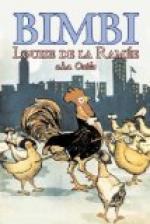At that moment there came out of the barrack gates, with great noise of trumpets and trampling of horses, a group of riders in gorgeous uniforms, with sabres and chains glancing and plumes tossing. It looked to Findelkind like a group of knights—those knights who had helped and defended his namesake with their steel and their gold in the old days of the Arlberg quest. His heart gave a great leap, and he jumped on the dust for joy, and he ran forward and fell on his knees and waved his cap like a little mad thing, and cried out:—
“Oh, dear knights! oh, great soldiers! help me! Fight for me, for the love of the saints! I have come all the way from Martinswand, and I am Findelkind, and I am trying to serve St. Christopher like Findelkind of Arlberg.”
But his little swaying body and pleading hands and shouting voice and blowing curls frightened the horses; one of them swerved and very nearly settled the woes of Findelkind forever and aye by a kick. The soldier who rode the horse reined him in with difficulty; he was at the head of the little staff, being indeed no less or more than the general commanding the garrison, which in this city is some fifteen thousand strong. An orderly sprang from his saddle and seized the child, and shook him, and swore at him. Findelkind was frightened; but he shut his eyes and set his teeth, and said to himself that the martyrs must have had very much worse than these things to suffer in their pilgrimage. He had fancied these riders were knights—such knights as the priest had shown him the likeness of in old picture books, whose mission it had been to ride through the world succoring the weak and weary, and always defending the right.
“What are your swords for, if you are not knights?” he cried, desperately struggling in his captor’s grip, and seeing through his half-closed lids the sunshine shining on steel scabbards.
“What does he want?” asked the officer in command of the garrison, whose staff all this bright and martial array was. He was riding out from the barracks to an inspection on the Rudolfplatz. He was a young man, and had little children himself, and was half amused, half touched, to see the tiny figure of the little dusty boy.
“I want to build a monastery, like Findelkind of Arlberg, and to help the poor,” said our Findelkind, valorously, though his heart was beating like that of a little mouse caught in a trap; for the horses were trampling up the dust around him, and the orderly’s grip was hard.
The officers laughed aloud; and indeed he looked a poor little scrap of a figure, very ill able to help even himself.
“Why do you laugh?” cried Findelkind, losing his terror in his indignation, and inspired with the courage which a great earnestness always gives. “You should not laugh. If you were true knights, you would not laugh; you would fight for me. I am little, I know,—I am very little,—but he was no bigger than I; and see what great things he did. But the soldiers were good in those days; they did not laugh and use bad words—”




